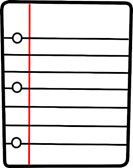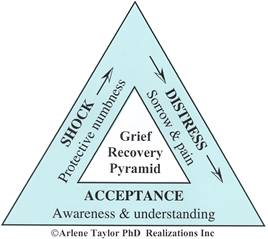Grief Recovery Pyramid & Epigenetics
You Can Recover From Your Losses
©Arlene R. Taylor PhD www.arlenetaylor.org
Waste no time in mindless grieving because it is over—smile and
give thanks because it happened at all!
—Arlene R. Taylor
 Loss can be described as the state of being deprived of something that you hoped for or once had or thought you had; the perception of being without something that you valued and wanted to retain. The loss can be physical—you can touch or measure it—or it can be abstract, perceived in cognitive, emotional, philosophical, behavioral, or spiritual dimensions. And often a combination of both. On this planet, there are times when the loss is temporary or can be fixed and repaired. There are also times when it cannot.
Loss can be described as the state of being deprived of something that you hoped for or once had or thought you had; the perception of being without something that you valued and wanted to retain. The loss can be physical—you can touch or measure it—or it can be abstract, perceived in cognitive, emotional, philosophical, behavioral, or spiritual dimensions. And often a combination of both. On this planet, there are times when the loss is temporary or can be fixed and repaired. There are also times when it cannot.
Avoid getting caught in the trap of defining loss too narrowly. It could involve the death of a partner, family member, friend, or pet or separation/divorce; displacement due to a natural disaster such an earthquake, hurricane, flood, or tornado; the loss of a body organ or body part; the loss of some sensory perception (e.g., sight or hearing); a hoped-for event that does not materialize or the diminishment of your options (e.g., inability to follow a certain career path). Defining loss more globally can help you to identify it more quickly and begin the process of effective grief recovery in a timely manner.
 Creating a Loss Line—hard copy or electronic—can help you picture losses over your lifetime; some of which may be prior to your actual birth. Write the date and the loss event in the middle of the page.
Creating a Loss Line—hard copy or electronic—can help you picture losses over your lifetime; some of which may be prior to your actual birth. Write the date and the loss event in the middle of the page.
- Note what you "lost" or gave up on the bottom portion of the page
- Note what you gained on the top portion because there is always a "gift" if you look for it.
- Note if you grieved the loss (N or Y) and your level of recovery.
Grief recovery is the process of learning to feel better and to achieve a condition of balance following any type of loss. For some, grief recovery means returning to a previously experienced state of soundness and balance; for others, it means attaining a state of soundness and balance that they may not have experienced before. It involves grieving the loss and healing the pain. Just as human beings can recover from the pain of surgery and feel better as the incision heals or recover from a broken bone and feel better as the bone heals, so you can recover from a loss and feel better as you move through the grieving process effectively.
Grief is something like a toothache. It rarely resolves on its own. Try to "stuff" all thoughts of the loss and avoid grief recovery and you can set yourself up for developing a slush fund of unresolved loss and grief in the brain. This can put you at risk for overreacting when even a small loss occurs down the line and can trigger behaviors that result in negative outcomes (a "mess"), which then may require considerable clean-up.
Elizabeth Kubler-Ross discussed the five stages of grief in her book On Death and Dying (1969). The five stages—denial, anger, bargaining, depression, and acceptance—have been landmark in helping individuals prepare for their own death. There can be a vast difference, however, between the grieving process useful in preparation for one’s own death and the grief-recovery process that is effective for survivors of loss.
 The Grief Recovery Pyramid is designed to help survivors work through loss episodes and move successfully through the grief recovery process.
The Grief Recovery Pyramid is designed to help survivors work through loss episodes and move successfully through the grief recovery process.
Identifying a loss, along with the perception of what it means to you in your life, and the choice to move through the grief recovery process both begin in the brain.
Stages I, II, and III follow, including Suggestions for Action. You may find yourself moving back and forth around the pyramid or even re-experiencing symptoms from time to time.
|
Stage I -Shock Symptoms may last from a few days to several weeks and may include:
|
Suggestions for action:
|
|
Stage II – Distress Symptoms may last from a few weeks to two years and may include:
|
Suggestions for action:
|
|
Stage III – Acceptance Timelines will vary for each individual.
|
Suggestions for action:
|
Remember, recovery is a process—an ongoing journey—that differs for each individual because each brain is different. It is what it is and you can do it.
What we have once enjoyed deeply we can never lose. All that we love deeply becomes a part of us.
―Helen Keller
Revised, 8/9/17

